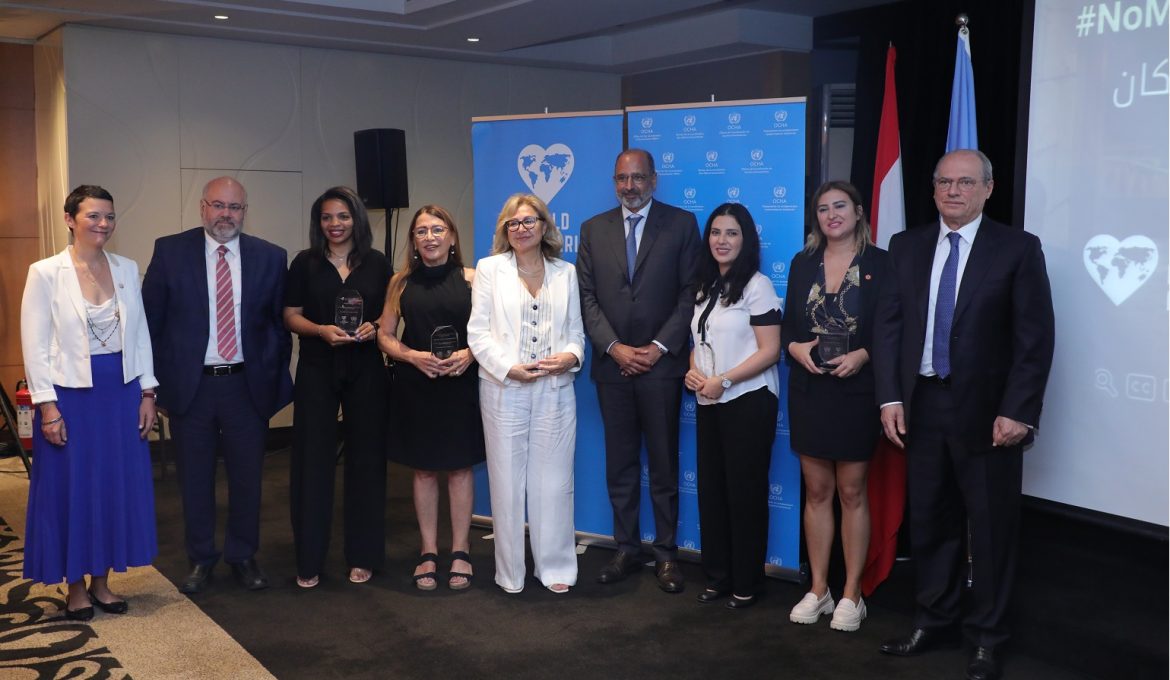Beirut, 18 August 2023 – Under the patronage of H.E. President of the Council of Ministers, Mr. Najib Mikati, and on behalf of the humanitarian community in Lebanon, the United Nations Humanitarian Coordinator in Lebanon, Mr. Imran Riza, and the United Nations Office for the Coordination of Humanitarian Affairs (OCHA) in Lebanon organized an honoring ceremony celebrating the World Humanitarian Day (WHD).The event was held in the Movenpick Hotel in Beirut in presence of the Deputy Prime Minister, Dr. Saade Chami, the Minister of Public Health, Dr. Firas Abiad, and a distinguished assembly of representatives from ministries, embassies, UN agencies, NGOs, and media.
Stressing the primary role of affected communities during crises, the UN Humanitarian Coordinator in Lebanon and the UNOCHA celebrated the occasion by presenting and honoring the work of five local organizations in Lebanon: Egna Legna, the Lebanese Red Cross, the Lebanese Union for People with Physical Disabilities, Women-Now for Development and Women’s Programs Association. Representatives from the five honored organizations underscored in their statement the significance of this recognition, reaffirming their commitment to principled humanitarian action to serve Lebanon’s most vulnerable communities, including Lebanese, refugees, migrants, and people with disabilities.
The ceremony commemorated the 20th anniversary of the tragic bombing at the United Nations compound in Baghdad on 19 August 2003, and celebrated humanitarian workers around the world for their unwavering commitment to deliver for the communities they serve, no matter who, no matter where and #NoMatterWhat.
In her opening remarks, the UNOCHA Head of Office in Lebanon, Ms. Séverine Rey paid tribute to humanitarian workers killed in the line of duty and reaffirmed the principles underpinning humanitarian action, calling for the protection, well-being and dignity of all people affected by crises, and for the safety and security of the aid workers who support them: “Attacks on aid workers and facilities – as attacks on civilians – are violation of international law and perpetrators must be held accountable. We are #NotATarget. We are here for one sole purpose: saving and protecting lives.”
Commending the commitment of all humanitarians in Lebanon, Mr. Imran Riza said, “Today, we are here to recognize and honor the dedication of humanitarian workers in Lebanon, particularly those, the most numerous, who are from the very communities they serve. Through their engagement, they show us that despite the challenges, a remarkable sense of shared humanity continues to prevail in Lebanon and that many resourcefully seek out solutions for the benefit of all. They bring hope for a better future in Lebanon. Humanitarian action is at its best when driven and led by the very people it serves – as the people themselves must be the architects of their own recovery.”
In his statement, the Deputy Prime Minister, Dr. Saade Chami, emphasized that, “Until economic recovery is achieved, and the country is put on the right track, it is incumbent upon us to rally behind humanitarian initiatives and cultivate a sense of unity. Whether we contribute materially, advocate for policy reform, or simply foster a culture of compassion, every action holds the potential to effect meaningful change. [..] It is within our grasp to salvage Lebanon, endowed as it is with abundant human capital, despite recent massive migration, a wealth of talents, decent resources, and people known for their entrepreneurial spirit and determination to succeed.”
Background
On 19 August 2003, a bomb attack on the United Nations Headquarter in Baghdad, Iraq, killed 22 aid workers, including the UN Special Representative of the Secretary-General for Iraq, Sergio Vieira de Mello. Five years later, the United Nations General Assembly adopted a resolution designating 19 August as World Humanitarian Day (WHD). Each year, WHD focuses on a theme, bringing together partners from across the humanitarian system to advocate for the protection, well-being and dignity of people affected by crises, and for the safety and security of aid workers who support them.

